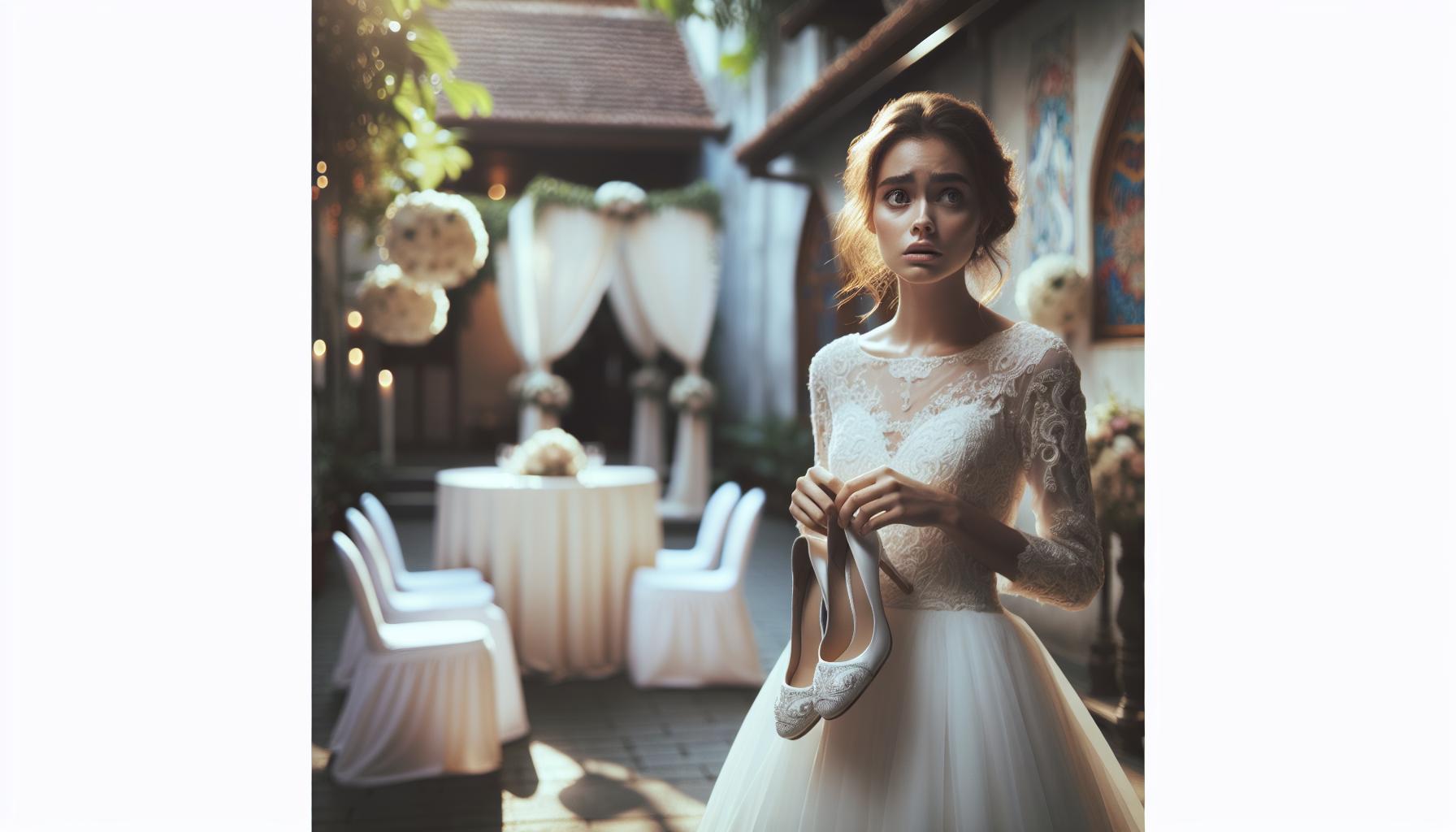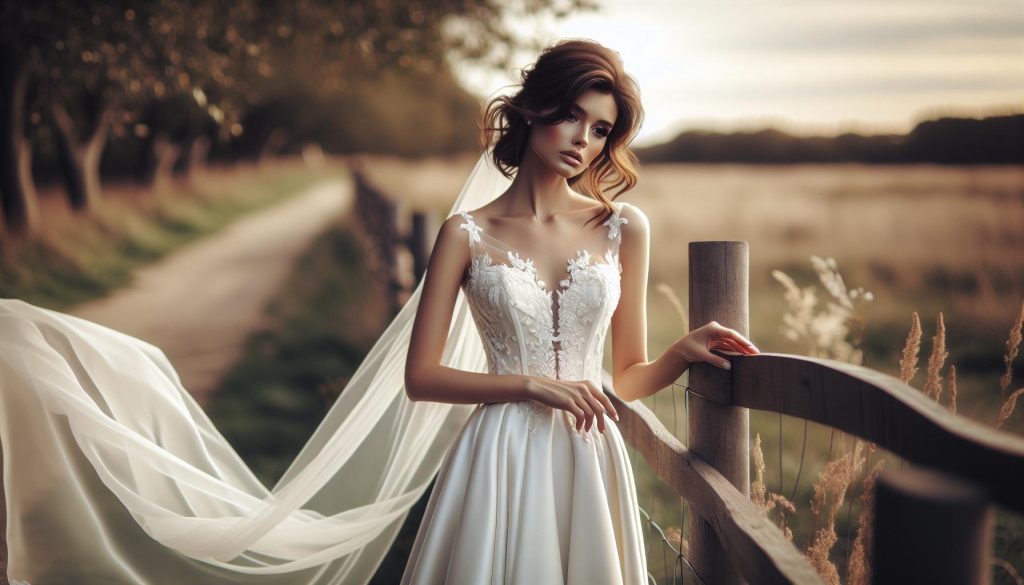Navigating the path to your wedding day can be both exhilarating and daunting, with emotions running high as the big day approaches. It’s not uncommon for brides-to-be to experience “cold feet,” a phenomenon often associated with the term “runaway bride.” Understanding this feeling is crucial; it can stem from natural anxieties about commitment, expectations, or life changes. Recognizing these feelings can empower you to address any underlying concerns, ensuring a more confident and joyful march down the aisle. In this article, we’ll explore the reasons behind this emotional turmoil and provide insights on how to transform apprehension into excitement, making your wedding day a celebration of love and commitment. Join us as we delve deeper into the complexities of bridal nerves and embrace the journey toward saying “I do.”
Understanding the Concept of a Runaway Bride
The concept of a runaway bride is often filled with layers of emotional complexity, reflecting deeper fears about commitment, change, and personal identity. Typically characterized by a woman who unexpectedly leaves her fiancé at the altar, the term invokes both sympathy and curiosity. While popular culture has dramatized the notion-with movies like “Runaway Bride” starring Julia Roberts-the reality can be far more nuanced and deeply rooted in psychological factors.
At the heart of the runaway bride phenomenon is the fear of commitment. This anxiety can stem from a variety of sources, including past relationship traumas, societal pressures, or personal doubts about compatibility with a partner. Many brides-to-be grapple with the weight of expectations-both their own and those imposed by family and friends. These pressures can create internal conflict, leading to feelings of doubt and overwhelming stress as the wedding day approaches.
Understanding the emotional landscape behind such a drastic decision can offer valuable insights for those involved. For some women, the act of running away signifies not just a fear of the wedding itself, but a deeper struggle with their identity and life choices. It’s essential for couples to recognize that these feelings are valid and deserve exploration, rather than dismissal. By engaging in open dialogues about fears and expectations, partners can foster a stronger connection and ensure that both individuals feel heard and valued in their relationship.
As wedding planning unfolds, it is crucial to create a space where both partners can express their anxieties without judgment. This proactive approach may not only prevent runaway scenarios but also enhance the overall wedding journey. Emphasizing communication, empathy, and mutual support allows couples to navigate their concerns together, thus celebrating love without the shadow of anxiety looming over their preparations.
Common Reasons for Cold Feet Before the Wedding
As the wedding day approaches, the excitement can sometimes be accompanied by an unsettling feeling known as “cold feet.” This phenomenon, often fueled by a mix of emotions, can stem from various sources, each reflecting the complexity of individual experiences and relationships. Understanding these reasons can help brides-to-be navigate their feelings with grace and clarity.
One common reason for experiencing cold feet is the fear of losing individual identity. The transition into marriage can be daunting, as it often involves a significant life change that might feel overwhelming. Brides may worry about how their relationship dynamics will evolve and whether they will still retain their sense of self within the partnership. This is particularly true for those who have invested much of their identity in their role as a partner or who fear that personal ambitions may be sidelined post-wedding.
Another contributing factor is the pressure of expectations, both from society and loved ones. The anticipation of the wedding day can lead to anxiety about not only planning but also living up to ideals surrounding the perfect marriage. Surrounded by friends and family who may have different views on relationships and commitment, brides-to-be might feel that they are under scrutiny, leading to heightened self-doubt. Engaging openly with loved ones about these pressures can bring relief and support.
Past relationship experiences also play a crucial role. Whether it’s a previous marriage, a long-term relationship that ended, or witnessing others go through difficult separations, these memories can create apprehension about making a lifelong commitment. It’s essential for brides to address these feelings, recognizing that it’s okay to be cautious, and to seek reassurance from their partner about their shared journey ahead.
In navigating these complex emotions, open communication is key. Encourage candid conversations with your partner about fears and hopes regarding the marriage. Create a safe space where both of you can express your thoughts and feelings without judgment. This approach fosters trust and understanding, and can transform potential anxieties into shared experiences of growth.
Embracing the path to your wedding day does not mean ignoring these feelings. Instead, acknowledging and addressing them allows for a deeper connection with oneself and with your partner, paving the way for a joyful celebration of love. By approaching wedding planning with a mindset of emotional honesty and mutual support, couples can celebrate their commitment free from shadows of doubt.
Identifying the Signs of a Runaway Bride
As the big day approaches, it’s essential for brides and their loved ones to recognize the potential signs of anxiety that could lead to a runaway scenario. Understanding these indicators can help mitigate fears and ensure a smoother transition into married life. Often, it’s the subtle shifts in behavior and mindset that can provide early warnings that a bride might be feeling overwhelmed or apprehensive about her upcoming nuptials.
One key sign to look out for is a marked change in enthusiasm about wedding planning. If a bride who once eagerly discussed ideas suddenly becomes reticent or dismissive, it may indicate she is feeling the weight of expectations. Pay attention to statements that suggest doubt or second-guessing about her partner or the wedding itself. For example, if she starts expressing concerns about compatibility or shares reservations about life after the wedding, it may signal deeper anxieties that need to be addressed.
Another concerning behavior is withdrawal from social interactions that typically bring joy. If she begins isolating herself from friends and family, avoiding conversations about the wedding, or showing increased irritability, these can indicate underlying fears of commitment or loss of identity within the marriage. It’s important for those close to her to create space for open dialogue, encouraging her to share her thoughts and feelings honestly.
Additionally, physical symptoms such as changes in sleep patterns, appetite, or increased stress levels can manifest as wedding anxieties. A bride might show signs of restlessness, fatigue, or even panic attacks when discussing the wedding, suggesting she may be feeling trapped by the impending ceremony. Observing these signs can help loved ones step in with support while reinforcing the idea that feelings of doubt are not only valid but also common in the lead-up to such a significant life event.
Recognizing and addressing these signs early can lead to a compassionate conversation about any hesitations or fears the bride may be experiencing. The goal is to foster an environment where she feels safe discussing her feelings, ultimately alleviating her worries about commitment and ensuring the journey to the altar is filled with love, joy, and excitement rather than dread.
Emotional and Psychological Effects of Wedding Anxiety
As couples approach their wedding day, a whirlwind of emotions often manifests into what is commonly referred to as wedding anxiety. This phenomenon can deeply impact the mental and emotional well-being of those involved, especially the bride-to-be. The pressure of expectations, combined with the substantial life change that marriage signifies, can lead to overwhelming feelings that may contribute to cold feet. Understanding the emotional and psychological effects of this anxiety is crucial for fostering a supportive environment during this pivotal time.
During the weeks leading up to the wedding, many brides may experience a range of emotions from excitement to sheer panic. It’s not uncommon for these feelings to vacillate, which can create confusion and exacerbate stress. For instance, moments of joy about planning can suddenly shift to feelings of doubt regarding the partnership, often fueled by the unrealistic expectations set forth by society, family, or even personal ideals. The psychological toll can manifest in various ways, including:
- Heightened Anxiety: Brides might find themselves feeling on edge, second-guessing their choices, or worrying excessively about the details that are seemingly out of their control.
- Increased Stress: Balancing the myriad of tasks involved in wedding planning can lead to fatigue, mood swings, and irritability, ultimately affecting relationships with loved ones.
- Fear of Commitment: The enormity of the vows being made can cause anxiety around long-term commitments, leading to questions about readiness or compatibility.
Feeling anxious is a perfectly normal reaction to the life-altering transition of marriage. Navigating through these feelings can be achieved through open and honest communication between partners. Encouraging dialogues can provide relief and foster understanding, allowing the couple to explore each other’s concerns without judgment. Moreover, engaging in self-care practices, such as mindfulness, exercise, and sufficient rest, can be instrumental in managing anxiety levels.
Remember, it’s essential to honor these feelings instead of pushing them aside. Embracing vulnerability can lead to a deeper connection and greater support from family and friends. Recognizing that many brides experience similar doubts can also bring a sense of solidarity. By focusing on love and commitment, couples can move from apprehension to excitement, paving the way for a joyful celebration of their union.
How to Communicate Concerns with Your Partner
Navigating the complexities of wedding planning can sometimes feel overwhelming, especially when doubts begin to creep in. Effective communication is key to addressing these concerns and ensuring both partners feel supported during this pivotal time. By discussing worries openly, couples can strengthen their bond and foster a deeper understanding of one another’s feelings, paving the way for a joyful partnership.
To begin, create a safe and inviting space for conversation. Choose a time when both of you can speak freely without distractions, ensuring the conversation doesn’t feel rushed or forced. Affirming the love and commitment you share can set a positive tone. Start by sharing your own feelings. For instance, “I’ve been feeling a bit anxious about the wedding preparations, and I’d like to talk about it together.” This approach encourages your partner to share their feelings without feeling defensive or pressured.
Active Listening
Practice active listening, which means fully engaging with your partner’s words. Respond with empathy and understanding, nodding or using verbal acknowledgments like “I see” or “That makes sense.” You can further encourage them by asking open-ended questions such as, “What aspects of the wedding are causing you the most stress?” This approach not only shows that you care about their perspective but also creates an open dialogue where worries can be discussed thoroughly.
Expressing Vulnerability
Embracing vulnerability can be transformative. Sharing your fears and insecurities allows both partners to relate on a deeper level, thus reinforcing trust. It’s important to articulate feelings without placing blame. For example, instead of saying, “You never help with planning,” you might say, “I feel overwhelmed when it seems like I’m handling most of the details alone.” This subtle shift focuses on your feelings rather than accusing your partner, which can prevent defensiveness and open the door to cooperative problem-solving.
Collaboration on Solutions
Once you have communicated your concerns, it’s time to collaboratively explore solutions. Suggest brainstorming together on how to lighten the stress associated with planning-whether it’s delegating tasks to family and friends or seeking professional help for planning assistance. This step not only involves both partners in resolving the issues but also reinforces teamwork, which is essential for a strong marriage foundation.
By fostering open lines of communication and supporting each other through this journey, couples can transform wedding anxiety into a shared experience of growth and understanding. Ultimately, approaching concerns together strengthens the relationship, leading to a joyful celebration of love rather than a day filled with fear and uncertainty.
Coping Strategies for Pre-Wedding Jitters
Pre-wedding jitters are a common experience, akin to an exhilarating rollercoaster ride that brings both excitement and anxiety. The looming commitment of marriage can provoke feelings of uncertainty, making it crucial to adopt effective coping strategies that transform these anxieties into affirmations of love and happiness. Embracing the journey with mindfulness and positivity not only eases stress but also enriches the wedding planning experience.
One excellent approach to managing pre-wedding jitters is through mindfulness practices. Setting aside time for activities such as meditation or yoga can help center thoughts and calm the mind. Incorporating deep-breathing exercises can be particularly beneficial during stressful moments, allowing you to focus on the present instead of worrying about the details yet to come. You might also consider journaling about your feelings, which can provide clarity and insight into any trepidations.
Additionally, establishing a strong support network is invaluable. Surrounding yourself with friends and family who uplift your spirits can transform your mindset. Engage in lighthearted gatherings, such as brunches or spa days, focusing entirely on fun rather than the stressors of planning. Inviting your closest confidants to share their experiences and insights about marriage may also provide comfort and perspective, making the commitment feel less daunting.
Furthermore, prioritizing self-care is essential. Whether it’s indulging in a favorite hobby, enjoying a warm bath, or treating yourself to a spontaneous outing, carving out moments just for you can replenish your energy and spirit. A little indulgence can also serve as a reminder that while planning for your big day is important, nurturing your well-being is paramount.
Finally, communication plays a pivotal role in alleviating wedding-related anxiety. Share your feelings and concerns with your partner. Creating a candid dialogue not only fosters intimacy but also ensures you’re both on the same page as you navigate the exciting yet challenging path toward your wedding day. As you practice these strategies, the love you share can become the anchor that steadies you, transforming jitters into joyful anticipation for the journey ahead.
When to Seek Professional Help for Wedding Anxiety
Amidst the whirlwind of wedding planning, it’s not uncommon for couples to encounter moments of doubt and anxiety. While some jitters can be perfectly normal, there may come a point when these feelings escalate beyond typical pre-wedding nerves. Recognizing when to seek professional help is crucial for ensuring both your emotional well-being and the health of your relationship as you navigate this significant transition.
If feelings of anxiety begin to interfere with your daily life-such as clouding your ability to focus on work, enjoy social activities, or partake in wedding planning-it may be a sign that professional guidance is needed. Take note if you experience persistent dread about the wedding, unrealistic fears about marriage, or if you find yourself withdrawing from friends and family. These can be indicators that the anxiety is more profound than you might have initially perceived. Reaching out to a therapist or counselor who specializes in pre-marital concerns can provide a safe space to explore these emotions and develop coping strategies tailored to your needs.
Additionally, if you notice significant changes in your mood, such as increased irritability, overwhelming sadness, or emotional outbursts, it’s important to address these feelings with a professional. Engaging in therapy can help you unpack underlying issues, from fear of commitment to past experiences that may be resurfacing. Understanding the root causes of your emotions can pave the way for a clearer perspective on your relationship and your upcoming marriage.
It’s essential to remember that seeking help is a sign of strength, not weakness. Couples often find that working through anxiety with the guidance of a professional not only alleviates their fears but also brings them closer together. By discussing concerns openly with a therapist, you and your partner can improve communication skills, build resilience, and learn to support each other effectively during the wedding journey. Embracing this proactive approach can turn the pressures of planning into an opportunity for deeper connection and understanding as you prepare to step into a beautiful new chapter of your lives.
Navigating Friends’ and Family’s Reactions
The journey to the altar is often accompanied by a whirlwind of emotions-not just for the couple, but also for friends and family who share in the anticipation. If cold feet emerge, it can lead to a variety of responses from loved ones that range from support to confusion or even disappointment. Understanding how to navigate these reactions is crucial for maintaining harmony during a potentially turbulent time. The goal is to foster open communication while preserving the joy of your impending union.
When emotions run high, friends and family may react in ways that reflect their own values and expectations for marriage. Some may express concern, believing that backing out equates to failure. Others might offer unconditional support, eager to love you through your doubts. To help manage these reactions:
- Be Transparent: Sharing your feelings with close friends or family members can provide the reassurance you need. This can initiate a constructive conversation that alleviates some of the pressure.
- Seek Understanding: Encourage loved ones to ask questions and express their concerns. You might find that their emotional investments stem from a place of love rather than judgment.
- Stay Grounded: It’s easy to get swept away by others’ emotions. Keep the focus on your feelings and decisions, taking time to reflect on your own needs.
- Set Boundaries: If particular conversations become too overwhelming, know it’s okay to step back and prioritize your mental well-being.
Maintaining a balance between expressing genuine emotions and listening to well-meaning advice can mitigate potential conflicts. It’s essential to paint a realistic picture of what you’re experiencing, as this fosters an environment where loved ones feel comfortable providing the support you actually need.
In many cases, friends and family may have their experiences and biases about weddings that color their perspectives. Navigating these varying viewpoints requires empathy and responsiveness. Ultimately, their reactions can be transformed into an opportunity for intimacy and understanding if open dialogue is prioritized. Cultivating a supportive environment plays a pivotal role in not only facing these challenges but also in celebrating a love that is resilient and true in the face of uncertainty.
Real Stories: Experiences from Runaway Brides
The phenomenon of a runaway bride captures not only headlines but also the hearts and imaginations of those who have walked similar paths. Many women have shared their experiences, revealing a tapestry of emotions that extend well beyond the moment of choosing to flee from the altar. It’s a reminder that each journey towards marriage is uniquely personal, often fraught with doubt, fear, and unexpected revelations.
One bride, Sarah, recounts her experience, sharing how she felt immense pressure leading up to her wedding day. Despite a seemingly perfect relationship, the weight of expectations, both internal and external, became overwhelming. “I remember standing in my wedding dress, surrounded by family and friends, but feeling utterly alone. I realized I was more scared of disappointing everyone than I was excited about the future,” she explains. Ultimately, she chose to take a step back, calling off the wedding to embrace her emotions and find clarity away from the chaos. This decision, while initially painful, became a transformative experience that led her to discover her true self and her core values, allowing her to pursue a love that truly fits her.
Another poignant story comes from Amanda, who found herself in a whirlwind of wedding planning, each detail a layer of stress. Months before the wedding, she started experiencing anxiety that she couldn’t shake. “I thought it was just me being a bride. Everyone told me cold feet were normal!” she shares. But one evening, while alone in her car, Amanda realized that her hesitance stemmed not from wedding jitters but from a deeper misalignment with her fiancé’s life goals. Sharing her feelings with him opened a dialogue that led them to postpone the wedding, ultimately allowing both to align their dreams. As Amanda puts it, “It wasn’t just about the wedding; it was about the partnership. We couldn’t move forward until we were truly on the same page.”
These real stories provide powerful insights into the plight of brides who face their fears head-on. They highlight the importance of honoring one’s feelings amidst pressures and expectations. By actively communicating fears and recognizing the signs of genuine misalignment, brides can navigate these moments with grace and confidence. Understanding that this journey is not solely about the wedding day but the thrilling path toward a shared life can empower individuals to embrace their choices, whatever they may be.
In contrasting experiences, it becomes evident that every runaway bride has a unique narrative shaped by individual circumstances, societal pressures, and personal introspection. Supporting each other through open conversations and embracing vulnerability can transform what might seem like failure into a profound stepping stone toward a fulfilling future. Such journeys, marked by honesty and courage, lay the groundwork for truly equitable partnerships grounded in mutual understanding and respect.
Tips for Addressing and Overcoming Wedding Fears
Planning a wedding is a wondrous journey, yet it often comes with an influx of emotions that can lead to anxiety-what many affectionately refer to as “cold feet.” Embracing this time with all its complexities can transform a potential crisis into an opportunity for personal growth and deeper connection with your partner. Here are some effective strategies to help navigate these feelings, ensuring a smoother transition into married life.
Begin by cultivating open communication with your partner. Sharing your thoughts and feelings about the wedding can demystify fears and lessen feelings of isolation. Create a safe space where both of you can speak openly. You might start with prompts like, “What worries you most about our wedding?” or “How do you feel about our future together?” By discussing your concerns, you foster understanding and allow your partner the chance to voice their own anxieties.
Another practical approach is to engage in mindfulness and self-reflection. Taking time to pause can reveal underlying fears that may be skewing your perspective. This can include activities such as journaling your thoughts or practicing meditation. Consider creating a personal vision board filled with images and quotes that reflect the marriage you envision. Visualizing a positive outcome can often overshadow pre-wedding jitters and redirect your focus to the love you share.
Moreover, involve your support network in the journey. Lean on trusted friends and family members who support your marriage. They may provide invaluable insights or merely remind you of the joy that this union brings. Hosting a casual gathering, such as a pre-wedding brunch or spa day, can shift your attention from the stresses of planning to celebrating love and connection with your closest allies.
Lastly, prioritize self-care in the midst of wedding preparations. Set aside moments for activities that rejuvenate you-whether it be pampering yourself, engaging in a beloved hobby, or simply spending quiet time alone. Establishing a routine that nurtures your mental and physical well-being can bolster your confidence, making the journey to the altar feel not just manageable, but also exhilarating.
By addressing and overcoming wedding fears together, couples can transform anxiety into deeper intimacy. Recognize that this chapter is about more than a single day; it’s about embarking on a lifelong adventure with your partner. Embrace the ride, trust the process, and smile at the beautiful love that awaits beyond the wedding day.
Preventative Measures: Ensuring a Smooth Transition to Marriage
Recognizing the intricate emotional landscape of wedding planning can significantly ease the journey towards your big day. The excitement of love can sometimes be overshadowed by the stress and anxiety that come with preparing for a wedding. To foster a smooth transition into marriage, it’s essential to embrace preventative measures that promote positivity and understanding. By prioritizing connection and communication, couples can build a solid foundation that withstands the pressures of wedding planning.
One effective strategy is to establish regular check-ins with your partner. Create dedicated time to discuss not just logistics, but also the feelings and concerns each of you may have regarding the upcoming commitment. This could take the form of weekly date nights where the focus is shifted from planning details to emotional support. You might explore questions like, “What part of the wedding excites you the most?” or “What are your biggest worries?” By validating each other’s feelings, you create an environment where both partners feel heard and appreciated, minimizing the chances of miscommunication and misunderstandings.
Additionally, embracing joint decision-making can empower both partners. When planning your wedding, consider doing so as a team rather than delegating tasks. This not only allows each person’s opinions to shine through but also enhances the bond you share. Whether it involves choosing the venue, selecting the menu, or picking out wedding attire, collaborating on these significant decisions helps instill a sense of shared purpose, alleviating the feelings of isolation that can trigger cold feet.
Self-care rituals play a crucial role too. In the hustle and bustle of planning, it’s essential to carve out moments for relaxation and rejuvenation. Encourage activities that nurture both your body and soul-be it taking yoga classes together, enjoying evening strolls, or simply cozying up with a good book. This dedicated time will serve as a reminder of the deeper connection that’s being formed, offering both partners a respite from wedding-related pressures and reaffirming their commitment to each other.
Lastly, don’t forget the power of a well-rounded support system. Surround yourselves with friends and family who can provide encouragement and advice. These supportive relationships can offer fresh perspectives and help reignite the joy of planning. Consider hosting pre-wedding gatherings that celebrate love and togetherness, such as a game night or a group dinner. Fostering community during this time can strengthen relationships and create lasting memories that enrich your marriage even before the ceremony.
By proactively engaging in these measures, couples can navigate the emotional currents of wedding planning with grace. Remember, the path to your big day is just as important as the event itself. Embrace the journey, cherish the feelings, and look forward to the beautiful adventure of marriage that awaits.
Celebrating Love: Finding Peace Before Your Big Day
In the whirlwind of wedding planning, amidst the floral arrangements and guest lists, it’s essential to carve out sacred moments that celebrate love and tranquility. Finding peace before your big day is not just beneficial; it’s transformative, allowing couples to reconnect with the joy that brought them to this moment. Rather than viewing the weeks leading up to the wedding as an overwhelming checklist, consider this an opportunity to bask in the glow of your romance and reinforce your partnership.
One effective way to savor this time is to create a series of pre-wedding rituals that resonate with your relationship. These could range from intimate dinners at your favorite restaurants, scenic hikes, or simple cozy nights at home. For instance, having a “no wedding talk” night can provide a refreshing break to deepen your emotional bond. Use this time to reminisce about your journey together, share dreams for the future, or even create a playlist of songs that define your love story. This approach can transform anxiety into anticipation, allowing you both to look forward to the big day with excitement rather than apprehension.
Incorporating mindfulness practices can also help cultivate a sense of calm. Consider enrolling in couples yoga or meditation classes, where you can focus on breathing and being present with one another. This shared experience not only nurtures your emotional health but also strengthens your connection. Additionally, engaging in creative projects together, like crafting invitations or planning a honeymoon, can ignite collaboration and unity, making the planning process enjoyable rather than stressful.
Lastly, don’t underestimate the importance of community support. Organizing informal gatherings with friends or family can infuse joy into the planning process. Whether it’s a potluck dinner or a game night, these moments of laughter and love can serve as reminders of the support surrounding you, alleviating the fear of walking down the aisle. Engaging with loved ones who celebrate your relationship will help create a positive atmosphere, allowing you to embrace your upcoming nuptials with confidence and serenity.
By prioritizing these connections and embracing moments of joy, couples can cultivate peace and strengthen their bond in the days leading up to the wedding. After all, the essence of marriage lies in celebrating your love, and there’s no better time to honor that than now.
Frequently asked questions
Q: What is a runaway bride?
A: A runaway bride refers to a woman who cancels or flees from her wedding, often due to anxiety or doubts about marrying. This phenomenon highlights emotional struggles surrounding commitment that can emerge right before the big day.
Q: What causes cold feet before a wedding?
A: Cold feet are typically caused by anxiety, fear of commitment, pressure from family, or significant life changes. Exploring these feelings can help couples address concerns before the wedding. Understanding these emotions is crucial for a smoother transition to marriage.
Q: How can I tell if I’m experiencing wedding anxiety?
A: Signs of wedding anxiety include excessive worry, feelings of overwhelm, difficulty sleeping, or second-guessing the relationship. If these feelings persist, it’s important to communicate with your partner or seek guidance, as recognized in the emotional and psychological effects of wedding anxiety.
Q: What should I do if I have cold feet?
A: If you’re experiencing cold feet, it’s essential to talk about your feelings with your partner or a trusted friend. Open communication and coping strategies can help alleviate fears and strengthen your relationship, leading to a more confident wedding day.
Q: When should I seek professional help for wedding anxiety?
A: Consider seeking professional help if anxiety interferes with daily life or leads to last-minute wedding cancellations. Therapists can provide support and coping tools to manage wedding-related stress effectively, aiding in a smoother transition to marriage.
Q: How can I communicate my concerns about the wedding to my partner?
A: Approach the conversation with honesty and openness, expressing your feelings without blaming. Use “I” statements to convey how you feel and ensure it’s a two-way discussion, encouraging your partner to share their thoughts as well.
Q: What are the common emotional effects of being a runaway bride?
A: Common emotional effects include guilt, shame, and fear of judgment from others. Runaway brides may also face anxiety about future relationships or doubts regarding their decision-making abilities, making it crucial to seek support from friends or professionals.
Q: How can couples ensure a smoother transition to marriage?
A: Couples can ensure a smoother transition by actively discussing their expectations and fears concerning marriage. Engaging in premarital counseling can also provide tools and strategies to enhance communication and strengthen their relationship.
The Conclusion
As you prepare for your big day, understanding the emotions that come with the possibility of being a runaway bride is essential. Remember, it’s perfectly normal to feel apprehensive; acknowledging these feelings can make the planning process smoother and more enjoyable. Dive into our related articles on overcoming wedding jitters and tips for creating a supportive environment for open communication with your partner.
Now is the time to take action! Explore our comprehensive wedding planning resources that guide you through every stage-from crafting the perfect guest list to selecting a venue that feels just right. Don’t let fear hold you back; embrace your wedding journey with confidence! Join our newsletter for insider tips and a supportive community dedicated to making your dreams a reality. Remember, your love story deserves a beautiful celebration, and we’re here to help every step of the way.
Share your thoughts or experiences in the comments below; we love hearing from you! Keep exploring our site for more inspiration and resources that can make your wedding day magical. Your happily ever after starts with informed decisions-let’s embark on this beautiful journey together!











